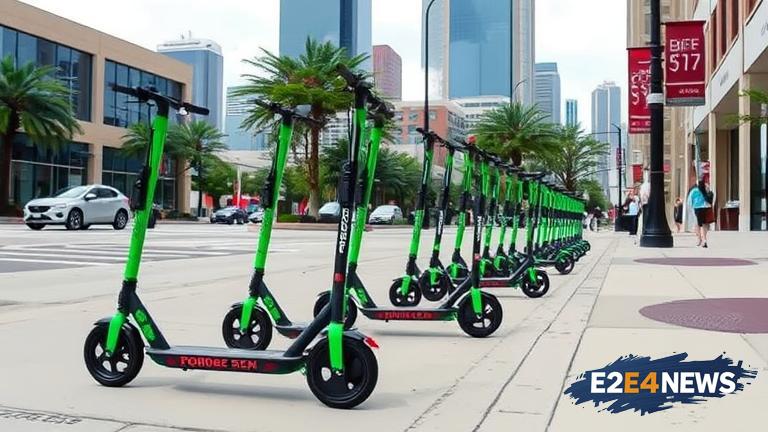The city of Houston is exploring the possibility of banning e-scooters in the downtown area, citing concerns over safety and the impact on local businesses. The proposal comes after a surge in complaints from residents and business owners about the presence of e-scooters on sidewalks and streets. According to city officials, the ban would aim to reduce congestion and improve pedestrian safety in the downtown area. The e-scooter industry has grown rapidly in Houston, with several companies operating in the city, including Bird, Lime, and Spin. However, the rise of e-scooters has also led to an increase in accidents and near-misses, with some pedestrians and cyclists reporting close calls with e-scooter riders. The city has received numerous complaints about e-scooters being ridden on sidewalks, ignoring traffic signals, and being abandoned in public spaces. In response, the city council is considering a ban on e-scooters in the downtown area, which would prohibit the devices from being ridden or parked in the area. The proposed ban has sparked debate among residents, with some arguing that e-scooters are a convenient and environmentally friendly mode of transportation, while others see them as a nuisance. City officials have stated that the ban would not be a blanket prohibition, but rather a targeted approach to address specific safety concerns. The city is also exploring alternative solutions, such as designated e-scooter lanes and improved enforcement of existing regulations. The e-scooter industry has pushed back against the proposed ban, arguing that it would stifle innovation and limit transportation options for residents. However, city officials remain committed to finding a solution that balances the needs of all stakeholders. The proposed ban is part of a broader effort by the city to regulate the e-scooter industry and improve safety on public streets. The city has already implemented regulations requiring e-scooter companies to obtain permits and follow certain guidelines, but officials say more needs to be done to address the growing safety concerns. The ban would likely be enforced through a combination of education and enforcement, with city officials working to raise awareness about the new regulations and issuing fines to those who violate them. The city is also exploring the use of technology, such as GPS tracking and data analytics, to monitor e-scooter usage and identify areas where safety concerns are most pronounced. As the city moves forward with the proposed ban, residents and business owners are watching closely to see how the regulations will impact the downtown area. Some have expressed concerns that the ban could harm local businesses that rely on e-scooters to attract customers, while others see it as a necessary step to improve safety and reduce congestion. The city council is expected to vote on the proposed ban in the coming weeks, and officials say they will continue to work with stakeholders to find a solution that works for everyone. In the meantime, e-scooter companies are bracing for the potential impact of the ban, with some exploring alternative markets and others lobbying city officials to reconsider the proposal. As the debate over e-scooters continues, one thing is clear: the city of Houston is committed to finding a solution that prioritizes safety and improves the quality of life for residents and visitors alike.





